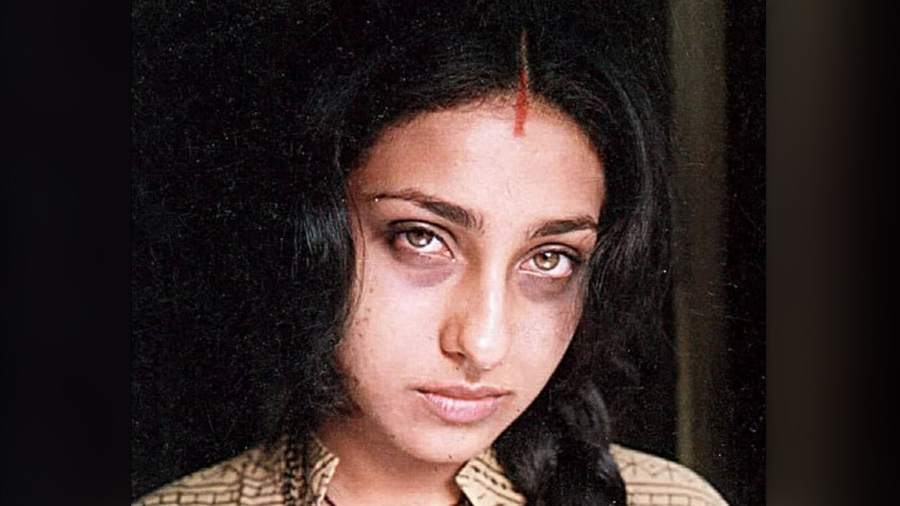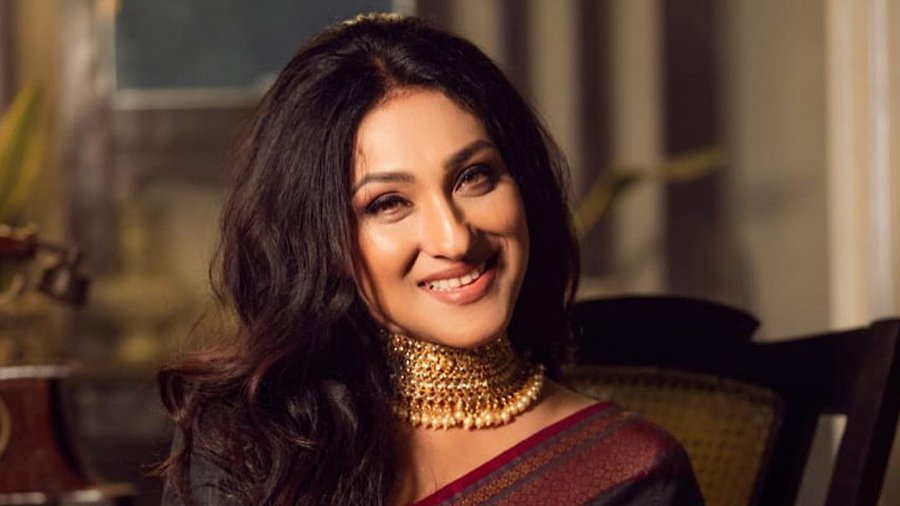‘You have the eyes of an early summer evening.’
We have just finished a screening of Ranjan Ghosh’s Mahishasur Marddini at the MCRC, Jamia Millia Islamia. A few of us are still recovering from the grim narrative. As the question-and-answer session unfolds, a young student, obviously smitten by the actors, offers what becomes the most memorable comment of the evening.
I watch Rituparna Sengupta, still somewhat caught up in the film, crack up. I realise that the student has a point. And like all good actors she uses those ‘early summer evening’ eyes to great effect. So much so that the look test of the film that established her credentials as an actor, Dahan, where the director, Rituparno Ghosh, called upon her to convey pain through her eyes, remains an abiding memory.
An accidental actor, Rituparna always wanted to be a teacher. “I dreamt of becoming a teacher. Anything to do with teaching, with illustrations, excited me. I loved geography. In high school, I took geography as a subject because it involved a lot of drawings. I hated maths. The only part I loved was geometry because it involved diagrams!’”
Hailing from a middle-class family — her father Prabir Kumar was employed with Pfizer; her mother Nandita was a homemaker — the children were not allowed to see much of films or watch television, though ‘good’ films were discussed at home. Her Kaku and Kakima, Indrajit Sengupta and Pritha Guha Roy Sengupta, both doctors, introduced her to films like Chokh and Grihajuddha. “My uncle used to indulge us a lot and take us to the movies and restaurants. He took us to films like King Kong, Born Free, A Nightmare on Elm Street, The Last Emperor. But cinema was not a big part of daily life, and I definitely had no inclination to be an actor.”
Fate intervened in the form of Jayshree Roy, wife of director Prabhat Roy, who had seen Rituparna in a fantasy TV series called Shwet Kapot (1989). And so it was that she moved from one Shwet to another — Shwet Patharer Thala (1992). “Prabhat-da called me and that’s the first time I entered the studios – NT1. Prabhat-da had his office there. He welcomed me with a smile. He was one of the leading commercial filmmakers of the time. He said, ‘Look, I’m not going to take any screen test. I see you and I feel you will be good, my wife has recommended you, so this role is yours and this is your character.’ I was like, ‘Oh my god! What’s happening?!’”
Remembered more as Aparna Sen’s biggest box-office success than for Rituparna’s small role as her son’s shrewish lover, the film won a National Award (Best Film on Family Welfare) and launched the actor on the road to stardom. She, however, said, “I got mixed reactions about the film. Everybody said, ‘She’s too fair, she has light eyes, her voice is shrill, she doesn’t have conventional Bengali looks.’”
In the 30 years since, Rituparna has been a major star in Bengali cinema, making her presence felt in both mainstream and arthouse cinema with equal felicity. As filmmaker Suman Ghosh says, “If you look at her oeuvre, there is no one else who has straddled the two different cinemas with such ease. To give you an example, she shot Paromitar Ek Din and Sasurbari Zindabad simultaneously. Aparna Sen was not even aware of it! And everyone knows what she did in Paromitar, while Sasurbari was a huge hit. She has been the top heroine of Bengali cinema for many years.”
Suman directed the actress in Basu Poribar (2019). And even in a film that had the who’s who of the industry, Rituparna managed to make her presence felt. Sample the sequence between the two siblings (played by Jisshu Sengupta and Rituparna) reminiscing about their childhood days, its mysteries and innocence now lost, and the wistfulness she brings to the moment. “She is extremely nice as a person. She understands the tone of the character, what we call ‘matra’, the measure. She is a professional par excellence. She is an actress any director would love to work with,” says Suman.
Here are a few personal favourites from Rituparna’s remarkable filmography.

Rituparna received the National Award for Best Actress for her performance in Dahan. Instagram
Dahan (1998)
Arguably her finest moment on screen, along with Paromitar Ek Din, this is the film that made audiences sit up and take notice. The film features a rare jugalbandi of performances (with Indrani Halder, both winning the National Award for Best Actress) and is justifiably regarded as one of the most important films in the history of Bengali cinema.
Rituparna remembers, “For the look test, Ritu-da [director Rituparno Ghosh] wanted me to convey pain through my eyes, a sense of devastation, grief. I had not been given a script. He just said, ‘I want that expression, what you’re going through, and I want to capture it.’ I don’t know what I did, but he liked it so much that the look was used on the posters when the film was released. Later, when a book was written on the film, its cover too used the same photograph.”
Paromitar Ek Din (2000)
The film that proved that Dahan was no flash in the pan, this Aparna Sen directorial explores the theme of friendship and bonding between women — in this case, a mother-in-law and daughter-in-law. There’s a very distinctive arc that the character has, starting out as a docile, submissive wife and emerging as a strong-willed woman, that Rituparna nails. “It was an insightful, difficult character to portray because there were no theatrics to fall back on. A girl from south Calcutta, married to a north Calcutta family, coping with a bad pregnancy, birthing an autistic child, deciding to walk out of her marriage, all the while maintaining a strong bond with her mother-in-law,” the actress says.
“I must mention Sohag Sen, who did a lot of workshops with us during Paromitar Ek Din. She knew the nuances the character should have. Before this, I had been doing flighty roles, the typical singing-and-dancing heroine. This was alien territory, a new experience, and Sohag Sen contributed a lot,” she adds.
Alo (2003)
Alo also happens to be one of her favourites. “I have received so much love and attention for this film. Till today people say, ‘Can’t we have another Alo?’ I have done two other films with Tarun Majumdar, Chander Bari and Bhalobasar Bari. He was an institution. Alo was a new dawn in Bengali cinema, a landmark film.”
Adapted from Bibhutibhushan Bandyopadhyay’s Kinnar Dal, the film cast Rituparna as a Kolkata girl who falls in love with a man who has his roots in rural Bengal. She decides to move to his village. In an archetypical ideal woman-as-a-divine-force character, Rituparna leaves an indelible impression. The film’s success cemented her position both as an actor and a bankable star.
Rajkahini (2015)
This is the film that took Rituparna farthest from her comfort zone. A character unlike any she had played before. As Begum Jaan, the irascible madam of a brothel situated on the newly carved border that becomes a metaphor for the Partition, she is a revelation. “The role scared me. I had no references. I had to give those gaalis – it was difficult for me. I had to change my voice, make it hoarse, every time she speaks it’s as if there’s a suppressed howl caught in her voice. My appearance, my body language, the way I walk, the way I eat — I had to go through a huge transformation,” says Rituparna.
Over to Srijit Mukherji: “I love the way she moulds herself… a perfect director’s actress. Add to that the fact that she is extremely hard-working and you couldn’t ask for more…. Rajkahini was a strenuous shoot. We had a month-long workshop. We had to kind of de-urbanise Ritu’s body language, tonality. There was a lot of stress on the sets. We were both trying very hard to ensure that we got it just right... and she nailed it.”
Ahaa Re (2019)
The one filmmaker with whom Rituparna has been closely associated in recent times is Ranjan Ghosh. Their 2019 collaboration, Ahaa Re, for which she received a Best Actress nomination at the New York Indian Film Festival, offers another glimpse of her abilities. As a woman who has bottled up her emotions after a personal tragedy and who finds in cooking and caring for her family a means to cope with her grief, Rituparna is a treat, with her eyes doing most of the talking. “She brings with her a lot of positivity and a lot of perceptivity,” says Ranjan. “She is extremely intelligent and is also very instinctive. Her physicality and a certain inner fire have brought out the best in her in my films.”
Ahaa Re also demonstrates Rituparna’s willingness to experiment with non-mainstream films as a producer. Having earlier produced Alo, she says: “I delve into subjects which are new and excite me. I am not a very strategic producer. Like my performances, my choice of films as producer is also instinctive. Ahaa Re gives me the confidence to produce more films.”
It is impossible to encapsulate a 30-year career in five films. Indrasis Acharya’s The Parcel is another terrific act. Rituparna is personally fond of Shiboprosad Mukherjee and Nandita Roy’s Muktodhara and Praktan, while I think that films like Mondo Meyer Upakhyan (Buddhadeb Dasgupta), Utsab (Rituparno Ghosh), Nishijapon (Sandip Ray), Anuranan (Aniruddha Roy Chowdhury), Teenkahon (Bauddhayan Mukherji), and Drishtikone (Kaushik Ganguly) stand testimony to both her abilities as an actor and her willingness to experiment with a range of characters. Those are films to be written about another day.
Shantanu Ray Chaudhuri is a film and music buff, editor, publisher, film critic and writer.











